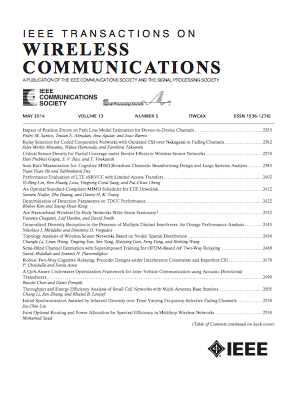Communication-Learning Co-Design for Differentially Private Over-the-Air Federated Learning With Device Sampling
IF 10.7
1区 计算机科学
Q1 ENGINEERING, ELECTRICAL & ELECTRONIC
引用次数: 0
Abstract
Recent years have witnessed the development of federated learning (FL) that allows wireless devices (WDs) to collaboratively learn a global model under the coordination of a parameter server without sharing their local datasets. To meet the communication efficiency and privacy requirements, over-the-air computation and differential privacy (DP) have been incorporated in FL by leveraging the signal-superposition property of multiple-access channels and using artificial noises to perturb local model updates, thereby preserving DP. In this paper, we propose an exploration into device sampling with replacement as a potential mechanism for augmenting the DP levels of WDs in over-the-air FL. In particular, we delve into the joint optimization of device sampling strategy, the number of training rounds, and over-the-air transceiver design. Our goal is to maximize the learning performance while ensuring each WD meets the DP requirement. The problem is challenging due to the intractable FL convergence rate and privacy losses under random sampling, coupled with the strong interconnection among mixed continuous and integer decision variables. To tackle this problem, we first analyze the learning convergence rate and privacy losses of WDs. The analysis allows us to derive the optimal transceiver design per round in closed forms. Then, we propose an efficient alternating optimization algorithm by deriving the optimal device sampling strategy and the number of training rounds in semi-closed forms. Our numerical results, based on real-world learning tasks, showcase the effectiveness of our proposed approach compared with representative baselines.利用设备采样实现差异化私有空中联盟学习的通信-学习协同设计
近年来,联合学习(FL)得到了发展,它允许无线设备(WD)在参数服务器的协调下协作学习一个全局模型,而无需共享其本地数据集。为满足通信效率和隐私要求,空中计算和差分隐私(DP)已被纳入联合学习,方法是利用多址接入信道的信号叠加特性,并使用人工噪声扰动本地模型更新,从而保留 DP。在本文中,我们提出了对设备替换采样的探索,将其作为一种潜在机制,用于增强无线 FL 中 WD 的 DP 水平。特别是,我们深入研究了设备采样策略、训练轮数和空中收发器设计的联合优化。我们的目标是最大限度地提高学习性能,同时确保每个 WD 满足 DP 要求。由于随机抽样下的 FL 收敛率和隐私损失难以解决,再加上混合连续和整数决策变量之间的紧密联系,这个问题极具挑战性。为了解决这个问题,我们首先分析了 WD 的学习收敛速率和隐私损失。通过分析,我们可以以封闭形式推导出每轮的最优收发器设计。然后,我们提出了一种高效的交替优化算法,以半封闭形式推导出最佳设备采样策略和训练轮数。我们根据实际学习任务得出的数值结果表明,与具有代表性的基线相比,我们提出的方法非常有效。
本文章由计算机程序翻译,如有差异,请以英文原文为准。
求助全文
约1分钟内获得全文
求助全文
来源期刊
CiteScore
18.60
自引率
10.60%
发文量
708
审稿时长
5.6 months
期刊介绍:
The IEEE Transactions on Wireless Communications is a prestigious publication that showcases cutting-edge advancements in wireless communications. It welcomes both theoretical and practical contributions in various areas. The scope of the Transactions encompasses a wide range of topics, including modulation and coding, detection and estimation, propagation and channel characterization, and diversity techniques. The journal also emphasizes the physical and link layer communication aspects of network architectures and protocols.
The journal is open to papers on specific topics or non-traditional topics related to specific application areas. This includes simulation tools and methodologies, orthogonal frequency division multiplexing, MIMO systems, and wireless over optical technologies.
Overall, the IEEE Transactions on Wireless Communications serves as a platform for high-quality manuscripts that push the boundaries of wireless communications and contribute to advancements in the field.

 求助内容:
求助内容: 应助结果提醒方式:
应助结果提醒方式:


